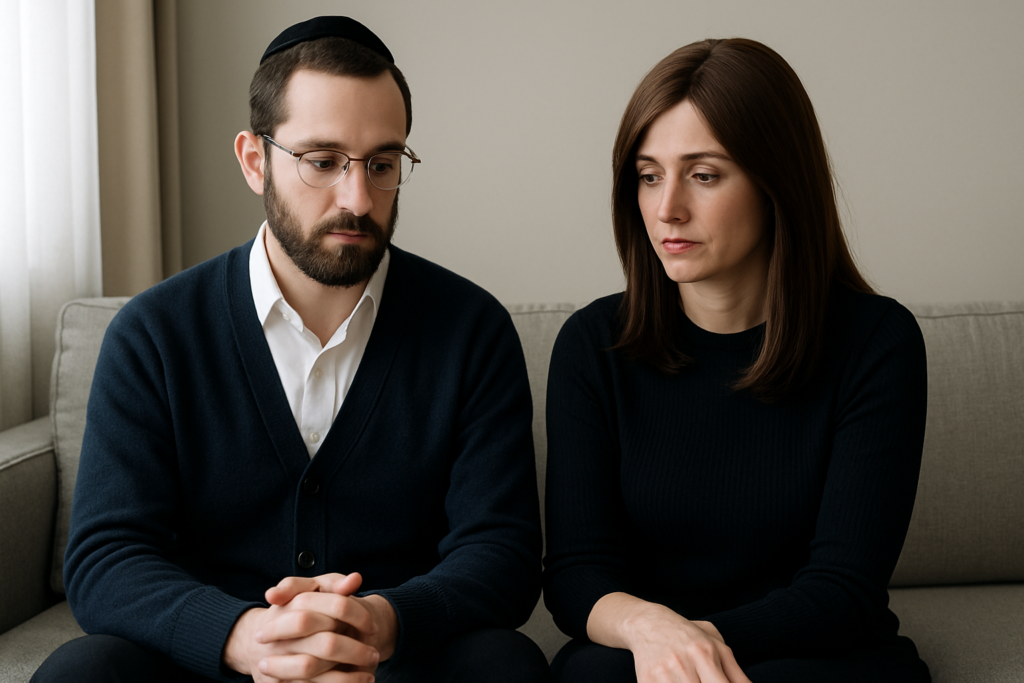A healthy marriage is the bedrock of a stable home, and stable homes are the bedrock of a healthy society. Research consistently shows that children thrive in environments where parents have positive, stable relationships, while exposure to marital conflict can lead to various emotional and behavioral challenges, such as increased anxiety and depression and impaired social and academic functioning. To make matters worse, statistics on both secular and frum communities indicate that marital discord is highest in the child-rearing years. Unfortunately, you don’t have to be a therapist to know that so many people are struggling in the most important area of their lives. Many never saw positive relationships modeled, and the life experiences they have gone through make effective relational practices far from intuitive.
The good news is that there are methods of couples counseling that are evidence based and have high success rates, especially if done early on in the marriage. Participating in premarital counseling can reduce divorce rates by approximately 30% and is associated with higher marital satisfaction. This proactive approach helps couples develop skills for conflict resolution and communication before issues become severe. Couples who go to therapy early, in the first two years of experiencing distress, report success rates of 70% to 80% in counseling. On average, however, couples wait about six years before seeking therapy, often after problems have escalated. This delay can make resolving issues more challenging and therapy less successful.
Despite the fact that many couples are suffering and can benefit from therapy, couples therapy seems to have more barriers to entry than individual therapy. Whereas 70% of therapists in the United States provide individual therapy, only about 20% provide couples counseling, making it less accessible and potentially more costly. Couples therapy also appears to carry more stigma. Whereas many seem to have accepted that individuals may benefit from therapeutic support, attending therapy with your spouse is often seen as a last resort for couples experiencing severe issues.
There is also the fear, particularly in our communities, that couples counseling may make marriages worse and this is not entirely unfounded. Some studies suggest that up to 25% of couples report being worse off after undergoing marriage counseling, which is enough of a reason to make someone pause and reconsider. It’s important to recognize, though, that this is not happening arbitrarily. As in any field, some couples therapists may lack the necessary training or experience and it is necessary to do adequate research to make sure that you are getting someone qualified and skilled. Even the best therapist is not always going to be able to save a marriage, but if someone is consistently having bad outcomes then it should make someone wary of the practitioner, but not throw the idea of getting help out the window.
The most evidence-based modalities for couples counseling are those that have been rigorously studied and shown to improve relationship satisfaction, communication, and emotional connection. Here’s a breakdown of several of the most effective ones:
1. Emotionally Focused Therapy (EFT)
- Success Rate: 90% report improvement.
- Focus: Building secure emotional bonds and improving emotional intimacy.
- Best For: Couples dealing with emotional distance, betrayal, or persistent conflict.
Developed by Dr. Sue Johnson, EFT helps couples recognize negative patterns and fosters secure attachment through vulnerability and responsiveness.
2. The Gottman Method
- Success Rate: 75%-80% report improvement
- Focus: Strengthening friendship, managing conflict, creating shared meaning.
- Best For: Couples needing concrete tools for communication and conflict.
Based on 40+ years of longitudinal research by Drs. John and Julie Gottman, this modality uses structured interventions and is particularly strong in teaching conflict resolution and emotional attunement.
3. Integrative Behavioral Couple Therapy (IBCT)
- Success Rate: 70% report improvement.
- Focus: Combines behavior change with emotional acceptance.
- Best For: Couples with chronic conflict or personality differences.
4. Cognitive Behavioral Couple Therapy (CBCT)
- Success Rate: 70% report improvement.
- Focus: Restructuring dysfunctional thoughts and behaviors in relationships.
- Best For: Couples dealing with miscommunication, negative thought patterns, or mild-to-moderate distress.
The above list is not conclusive and there may be other modalities that are still effective despite having less formal research done on them. Just as with any other important decision in life, finding the right therapist requires careful thought and deliberation. Our marriages are too important to be left floundering. We may have gotten better at early intervention in children, but early intervention in marriage is no less important.
Chayi Hanfling is a licensed clinical social worker who is experienced and passionate in helping individuals, families, and couples. She specializes in couples counseling, EFT, women’s health, anxiety management, OCD, trauma, and other mental health challenges. She can be reached at www.chaicounseling.org or [email protected]











